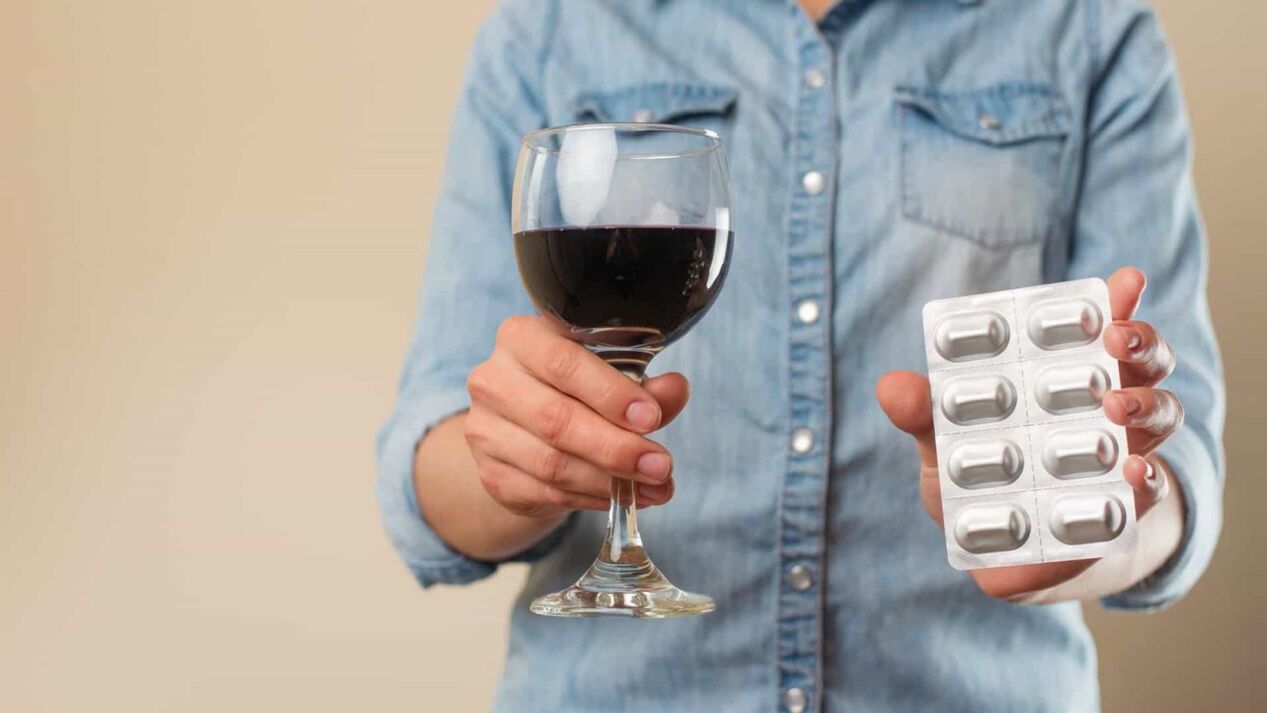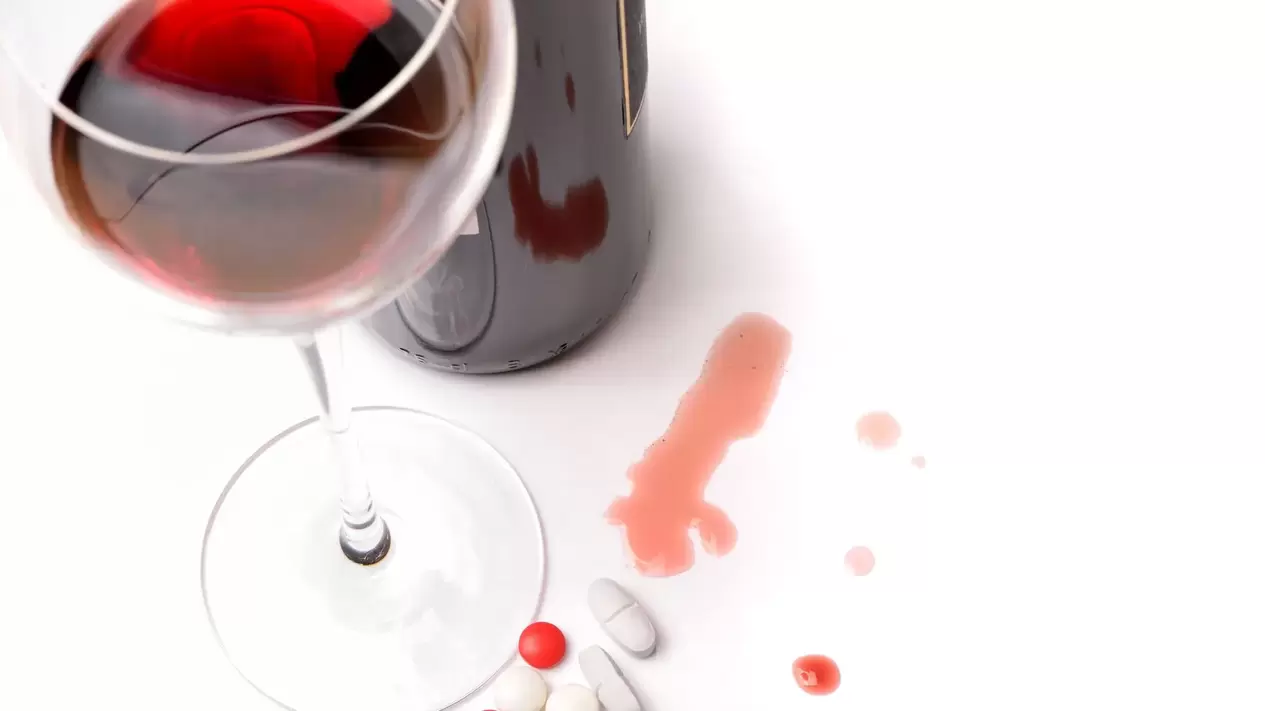Sometimes the dentist will prescribe a course of antibiotics.This happens when there is a bacterial infection in the mouth.You should take antibacterial drugs and follow certain rules, which your doctor will tell you individually.One of the most frequently asked questions is whether antibiotics and alcohol can be used together?We discuss this in detail in the material.
Can I drink alcohol while taking antibiotics?
You've been prescribed antibiotics and you don't know if you can have a glass of wine or a beer.There is a school of thought that antibiotics and alcohol should not be mixed.For many people who don’t like drinking, it even becomes a convenient excuse to drink.As soon as you say you're taking antibiotics, the persuasion to drink stops immediately.However, legends are legends and it never hurts to find out the truth.Let's find out whether you can afford alcohol during your antibacterial treatment.
First, let’s briefly introduce antibiotics.These are medicines that treat bacterial infections.Different antibiotics have different mechanisms of action, but the result is the same—the bacteria die or are unable to reproduce.
important.Antibiotics are not used to treat viral illnesses because they do not fight viruses.Therefore, antibiotics are not recommended for flu and colds.Many people take antibiotics immediately after experiencing symptoms of acute respiratory illness, which is a big mistake.You should take these medications only with your doctor's permission.
Like other medicines, antibiotics have side effects.It is important to note that the potential for side effects may be increased when combined with alcoholic beverages.In addition, there is a risk of new adverse reactions.By the way, this applies not only to antibiotics, but also to other medications such as sleeping pills, anti-allergy medications, sedatives, anti-inflammatories, and pain relievers.
When it comes to antibiotics and alcohol, the compatibility of the two has been questioned, and it's important to be aware of how alcohol interacts with medications.Let's consider the two main mechanisms by which antibiotics and alcohol don't mix.
drug metabolism
Any drug is metabolized in the body, that is, it undergoes a series of transformations.The medicine has begun to disintegrate in the mouth.This process is enhanced in the gastrointestinal tract, and the drug is absorbed into the bloodstream in the small intestine.The substance then passes through the liver, where it is changed.The drug circulates in the blood for a period of time and is then excreted (usually in an altered form) in the urine.
Now let's figure out what happens when you drink alcohol while receiving antibiotics.Like drugs, alcohol is metabolized.This happens in the liver with the help of specific enzymes.If the liver needs to process alcohol and drugs at the same time, the enzymes are either working too fast or don't have time to complete their jobs.
If the liver works too quickly, the antibiotics will be destroyed too early to have their full therapeutic effect.If liver function is slowed, antibiotics can build up in the blood too quickly, making the drug very toxic.

increased side effects
In some cases, combining alcohol with antibiotics may lead to increased side effects or new side effects (from taking antibiotics).In particular, this applies to antibiotics that cause drowsiness, for example.If you also drink alcohol, your drowsiness will increase.
However, in addition to the increase in the main side effects (specified in the drug package insert), new side effects may occur.Typically these symptoms include headaches, nausea, cardiac arrhythmias, intestinal disorders, and abdominal pain.
IMPORTANT: Antibiotic resistance.Bacteria evolve like any other organism, adapting to new environmental conditions.In this case, they are able to adapt to the effects of antibiotics.This is how antibiotic resistance develops - certain types of bacteria become resistant to one antibiotic or another.Currently, this is one of the most serious medical problems because drug-resistant bacteria are becoming more common and finding new antibiotics is difficult.Uncontrolled use of antibiotics is one of the causes of bacterial resistance.Often, patients will stop taking their medications on their own once they feel better.You can't do that with antibiotics.Even if you feel significant relief "early", be sure to drink the entire course of medication prescribed by your doctor.
What happens if alcohol contains antibiotics?
Let’s look at some of the negative consequences of taking alcohol and antibiotics together.Let us point out right away that this phenomenon may not be observed, but we are obliged to tell our readers about it because this reaction occurs in medical practice.
- Liver dysfunction.If your liver is healthy, you may not feel the effects of alcohol mixed with antibiotics.However, be aware that the liver is under a double burden of processing both alcohol and drugs.
- neurological diseases.For some people, the combination of alcohol and antibiotics can cause serious disturbances in the central and peripheral nervous systems.Specific manifestations include headache, dizziness, nausea, and even convulsions.
- sleep disorders.Disturbances may occur until day and night are reversed.
- cardiovascular disease.The most common are changes in blood pressure (up and down).
- allergic reaction.In rare cases, antibiotics and alcohol can cause severe allergic reactions, including anaphylactic shock.The latter is a serious disease that threatens human life.In this case, you need to call an ambulance.
- digestive tract diseases.Mixing antibacterial drugs with alcohol may cause indigestion, abdominal pain, and diarrhea.
How many days can I drink alcohol after taking antibiotics?
How much alcohol should not be consumed after taking antibiotics?This is also one of the most frequently asked questions by patients who are forced to take antibacterial drugs.In this case, a lot depends on the specific drug, how long it takes to clear it from the body.
In most cases, two days (48 hours) of rest after taking antibiotics is enough, after which time you can drink alcohol.In some countries, they recommend waiting 3 days.There is no consensus on this issue.The only thing for sure is that you need to wait at least 2 days.

Why you shouldn't drink alcohol while taking antibiotics
Medical literature (scientific articles, treatment recommendations, etc.) talks about the dangers of combining antibacterial drugs with alcohol, pointing out that many negative phenomena occur when alcoholic beverages and antibiotics are taken together.The negative consequences can be attributed to two undesirable effects, namely:
- Antimicrobial treatment becomes less effective.Alcohol has been shown to inhibit the antibacterial activity of antibiotics.Therefore, the suppression of pathogenic microbiota is less effective, which requires prolonged treatment or the search for new antibiotics.
- liver damage.The simultaneous use of alcoholic beverages and antibiotics places a significant burden on liver tissue.Not only is the risk of liver toxicity increased, but so is the risk of toxicity in the body, since the liver is the filter through which blood passes.
Let’s see how true these claims are.What happens to the body if antibiotics and alcohol are mixed?
As for reducing the effectiveness of antibiotic treatment, the danger is real.But this applies not only to antibiotics, but to other drugs as well.It is important to note that there is currently no convincing data on the negative effects of alcohol on various types of antibiotics.In one animal study, no interaction between antibiotics and alcohol was observed.One human study did not show a significant decrease in the effectiveness of antimicrobial treatment.
However, the instructions for such drugs state in black and white that abstinence from alcohol is recommended.Experts say there's not enough research on the issue, so it's best to stay away from alcohol when taking antibiotics.Furthermore, in the studies conducted, volunteers were given small doses of alcohol, which most likely did not have a significant effect on the metabolism of pharmacological drugs.So, to the question of whether you can drink alcohol while taking antibiotics, the answer is still no.
To sum up, we can identify 5 main reasons why it is not advisable to use antibiotics and alcohol at the same time:
- Deterioration of metabolic processes.Alcoholic beverages impair the absorption of nutrients, vitamins, minerals and medications.This means that the antibiotic is less absorbed into the bloodstream, making it less effective.
- elevated blood sugar.Alcohol is metabolized in the body to form sugar.For people with diabetes, this is a particularly dangerous situation.Furthermore, an increase in sugar levels during infectious diseases only exacerbates the progression of pathological processes, since sugar is a substrate for pathogenic microorganisms.
- Decreased immunity.Consumption of alcoholic beverages lowers the body's defenses.Therefore, the infectious process only intensifies.
- allergy.Mixing antibiotics and alcohol can increase the likelihood of allergic reactions such as rashes.
- unpredictable consequences.Despite the conflicting evidence base, it is difficult to make predictions about drug-alcohol interactions in each specific case.Maybe this combination will give you bad consequences.
IMPORTANT: Antibiotics and other medications.For the information of the reader, it is not advisable to use antibiotics not only in combination with alcohol, but also with other drugs.When prescribing antimicrobial treatment, doctors will certainly ask the patient what medications they are currently taking.Generally speaking, antibiotics are not recommended to be used in combination with anticoagulants, anticonvulsants, some antidiabetic drugs and other drugs.If for some reason your doctor forgets to ask about the medications you are taking, then do not hesitate to ask him this question.

Antibiotics and beer
Or maybe beer with antibiotics in it, since that's the least "strong" of all alcoholic beverages?In fact, beer is a low-alcoholic beverage.The insidious thing about it, however, is that people usually drink a lot of beer.Therefore, 100 ml of beer contains approximately 3-6 ml of pure alcohol.So if you drink 0.5 liters of beer, this is already 15-30 ml of ethanol.If the beer is very strong, then this is already 40-50 ml of alcohol.
You also shouldn't take it easy on alcohol-free beer, as it still contains some amount of alcohol.Therefore, if you are taking antibiotics (especially for a short course), it is best to avoid alcohol, even beer.For your health, wait a week or two without drinking a beer.
wine with antibiotics
The same is true for wine as for beer.At the same time, wine is a strong drink, and the alcohol content per unit volume of wine is more than that of beer.
Cognac and antibiotics
The alcohol content of strong alcoholic beverages such as cognac, brandy, whiskey, and vodka is much higher than that of wine and beer.During antimicrobial treatment, it is best to avoid such alcoholic beverages.It is not true that alcohol somehow interferes with the action of antibiotics.But even without convincing data, abstaining from alcohol is still the better option.It's definitely not going to get worse.
Antibiotics and Alcohol: Myths
Therefore, as mentioned above, the negative impact of alcohol on antibiotics is a controversial issue.No one has proven this yet.Medical advice about abstaining from alcohol during antimicrobial treatment is more like "insurance" against possible negative effects.
There are several theories why doctors still prohibit alcohol consumption while taking antibiotics.One of them is that when doctors treat venereal diseases, they only punish their patients for their dissolute lifestyle.
There is also an interesting story related to the shortage of penicillin during World War II.It was in Africa, where British troops were conducting military operations.To doctors there, penicillin was worth its weight in gold.In order to isolate penicillin and repurpose the drug, urine was extracted from sick soldiers.But if you drink beer at the same time, your urine output will increase dramatically, complicating the process of excretion of the drug from your urine.Therefore, patients taking antibiotics are prohibited from drinking alcohol.
Amoxicillin antibiotics and alcohol
In addition, many patients may have a question: Can I drink alcohol while taking such drugs?Are they suitable with beer, cognac and other alcoholic beverages?It is worth noting that the foreign instructions for amoxicillin and clavulanic acid do not indicate the side effects related to combined use with alcohol.There are no studies on the negative effects of amoxicillin combined with alcohol to reasonably prohibit patients from drinking alcohol during antibiotic therapy.

Cephalosporin antibiotics and alcohol
Mixing such drugs with alcohol is not advisable as this can cause a disulfiram-like reaction.Through this interaction, the breakdown of ethanol is inhibited, leading to the accumulation of acetaldehyde, which has toxic effects on the body.
Azithromycin antibiotics and alcohol
Regarding the popular antibiotic based on azithromycin, studies were conducted on experimental animals.In particular, it was found in rats that the effectiveness of azithromycin was not reduced when drinking alcohol at the same time.However, the drug's instructions indicate that simultaneous use of the drug with alcohol is not advisable.This is mainly due to the negative effects of alcohol on the liver.
in conclusion
If we summarize all the above, we can say the following.In most cases, antibiotics do not lose their effectiveness when taken with alcohol.However, given the negative effects of alcohol on the liver, this combination is best avoided.Drinking alcohol will certainly not speed up treatment, so it is best to avoid drinking alcohol during antibiotic treatment.
























